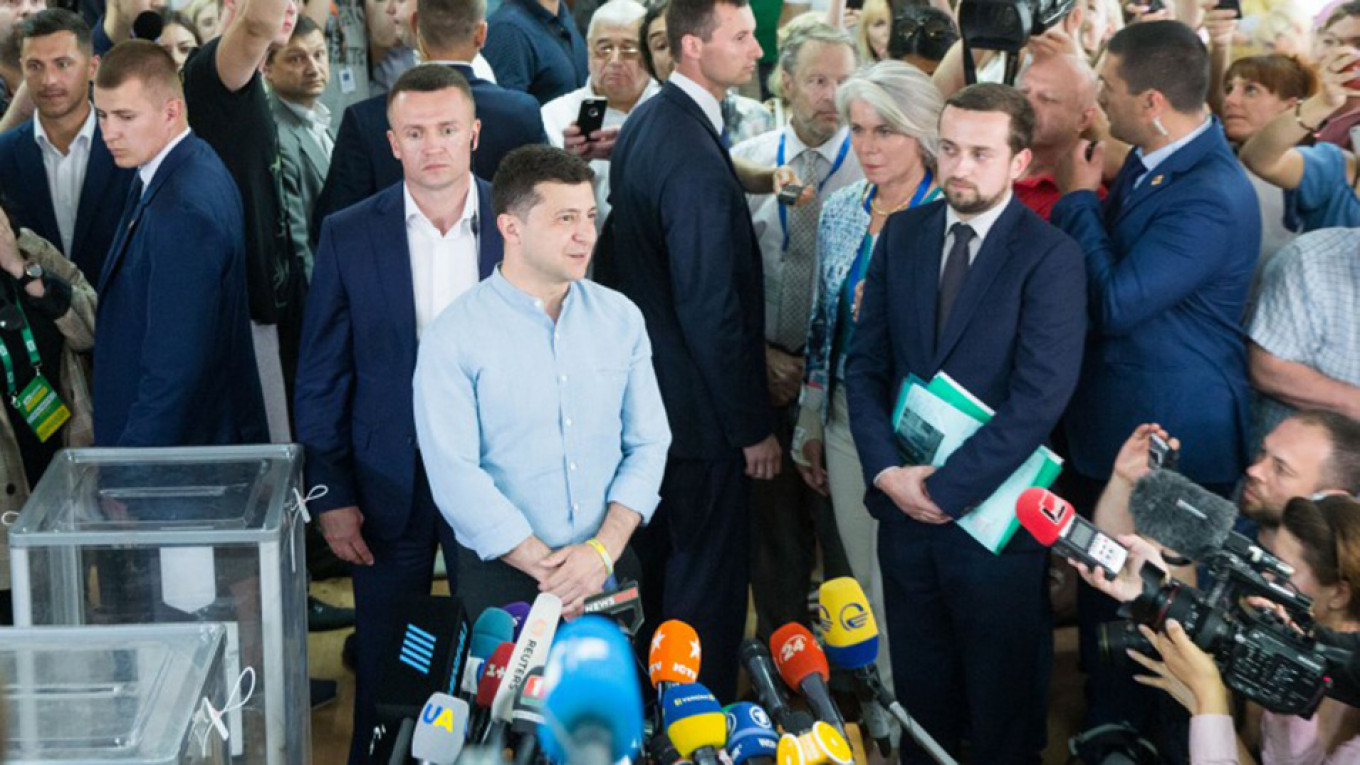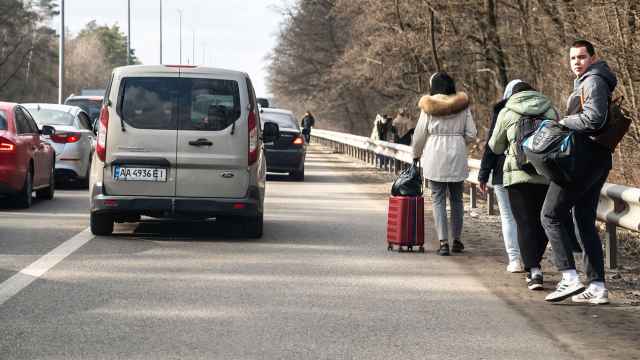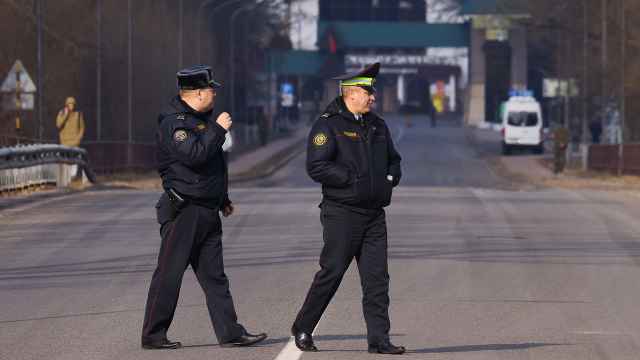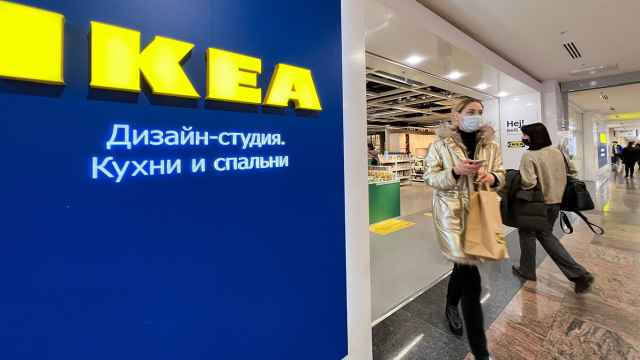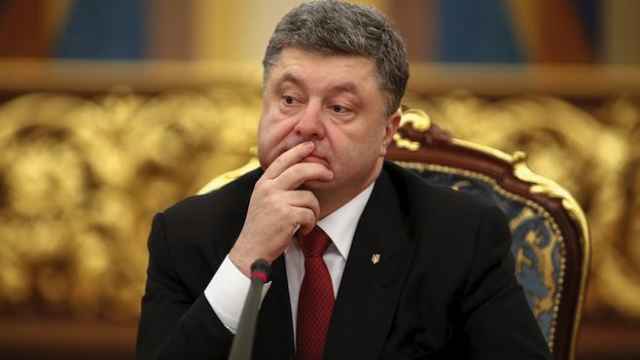Ukrainian President Volodymyr Zelenskiy’s party, Servant of the People, is set to win Sunday’s parliamentary election, gaining a near-majority that would hand the novice president more power than his predecessor enjoyed. What Zelenskiy is going to do with it is largely still a mystery.
Ukraine’s constitution places the responsibility for forming the cabinet in the parliament’s hands. This means Zelenskiy, elected in April on promises of draining the political and bureaucratic swamp, has had his hands tied so far: The outgoing parliament, which he dismissed soon after taking office in May in order to hold an early election, has been hostile to him. (Because Servant of the People was registered only last year, it had no sitting members of the legislative body.) Zelenskiy, for example, got into a public row with Foreign Minister Pavlo Klimkin, who failed to consult him as he continued former President Petro Poroshenko’s rigid, unproductive line in the matter of freeing 24 Ukrainian sailors held captive in Russia. The president has been unable to get the parliament to dismiss Klimkin.
So Zelenskiy, a former comedian and TV producer, focused on running his party’s election campaign rather than trying to govern. His approach was two-pronged: Proving to voters that he’s going to be relentlessly demanding of Ukraine's bureaucracy and political class and showing that he’s willing and able to de-escalate the conflict with Russia.
To the former end, he traveled around Ukraine and spoke harshly with various officials. In Boryspil, a small city just east of Kiev, he kicked a city council official out of a meeting, denouncing him as a “highwayman” and a “devil.” “Do you consider me an idiot?” he asked Oleksandr Vlasov, head of Ukraine’s State Fiscal Service during a meeting in Odessa before asking for his resignation. (Vlasov resigned, though Zelenskiy had no power to fire him). In the industrial city of Zaporizhzhya, he made the mayor promise to resign if an important bridge isn’t fixed by October 15.
These fireworks have been somewhat reminiscent of Nikita Khrushchev, who once ran Soviet Ukraine and then the entire Soviet Union with similar brio; or of Alexander Lukashenko, the dictator of neighboring Belarus. But, in the context of a campaign, it was probably the best way for Zelenskiy to show he is holding true to his promise of renewal. To boost the message, Zelenskiy proposed that top officials and state company bosses from the Poroshenko presidency be “lustrated” – banned from government jobs.
Ukraine’s anticorruption agencies, meanwhile, have taken a sudden interest in businesses close to Poroshenko and his team; officially, Zelenskiy has nothing to do with that.
Negating Poroshenko’s showy militarism was the other pillar of Zelenskiy’s campaign. He canceled the Independence Day military parade in August, one of his predecessor’s favorite events, and ordered that its cost of $11.5 million be paid out as bonuses to troops. And he worked hard to engineer a big prisoner exchange with Russia, something Poroshenko was loath to do, insisting that the Kremlin unconditionally release dozens of Ukrainians held in Russia on various political charges.
At the time of this writing, the exchange hadn't occurred, but significant steps had been taken to make it possible. Swallowing his pride, Zelenskiy called Russian President Vladimir Putin on July 11 to discuss the issue. The two countries’ human rights commissioners, Ukraine’s Lyudmyla Denisova and Russsia’s Tatyana Moskalkova, met in Moscow to exchange lists of prisoners. The Ukrainian list included the 24 sailors taken prisoner by Russia last year when their vessels tried to break through to the Sea of Azov port of Mariupol past a de facto Russian blockade. (This request earned Zelenskiy some criticism, since an international maritime tribunal had ruled that Russia should free rather than exchange them. ) On Wednesday, however, a Russian court extended their detention another three months.
Whether the prisoner exchange takes place in the coming days or not, Zelenskiy has succeeded in showing Ukrainians that, though he has no intention of surrendering to Putin, he’s focused on negotiating rather than simply relying on Western support or nurturing vain hopes of an eventual military victory. That reinforces his earlier, popular promises to work toward ending the war with Russian-backed separatists.
All this activity has kept Servant of the People’s support steadily above 40 percent in an overwhelming majority of polls. No other party has been polling more than 12 percent. Poroshenko’s European Solidarity Party has failed to get much traction, and former prime minister Yulia Tymoshenko’s Fatherland and rock singer Svyatoslav Vakarchuk’s Voice parties appear destined to play bit parts in the next parliament unless Zelenskiy needs their support to form a majority coalition. Even if that occurs, their rewards still won’t be huge, given their low support levels.
Essentially, Zelenskiy has owned the campaign on the national level. The only likely surprises can come from first-past-the-post constituencies, which fill half the parliament. That system leaves the old elites a chance to hold on to some political influence, and Servant of the People’s candidates in some localities appear weak compared with the political veterans and business tycoons running against them.
Nonetheless, Zelenskiy has a shot at near-dictatorial powers. So far, he’s given little indication of what he might do with them, and there’s no unity even among his closest advisers on how soft or how tough a stance Ukraine must take with Russia and its own Russian-speaking population. The world has only really seen Zelenskiy the politician in campaign mode. He’s been impressive – but he’s still a wild card as Zelenskiy the leader.
A Message from The Moscow Times:
Dear readers,
We are facing unprecedented challenges. Russia's Prosecutor General's Office has designated The Moscow Times as an "undesirable" organization, criminalizing our work and putting our staff at risk of prosecution. This follows our earlier unjust labeling as a "foreign agent."
These actions are direct attempts to silence independent journalism in Russia. The authorities claim our work "discredits the decisions of the Russian leadership." We see things differently: we strive to provide accurate, unbiased reporting on Russia.
We, the journalists of The Moscow Times, refuse to be silenced. But to continue our work, we need your help.
Your support, no matter how small, makes a world of difference. If you can, please support us monthly starting from just $2. It's quick to set up, and every contribution makes a significant impact.
By supporting The Moscow Times, you're defending open, independent journalism in the face of repression. Thank you for standing with us.
Remind me later.



